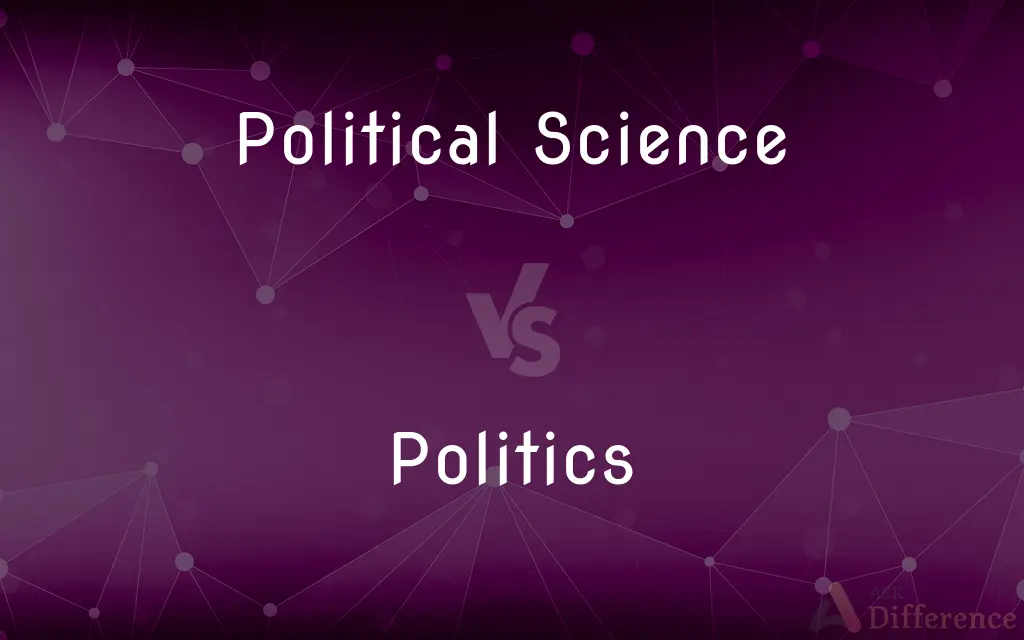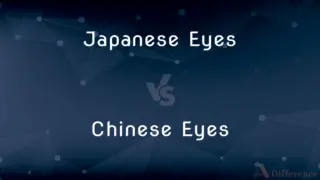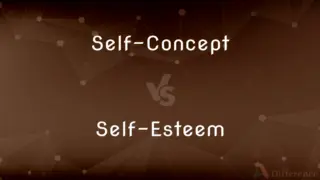Political Science vs. Politics — What's the Difference?
By Tayyaba Rehman — Published on October 24, 2023
Political Science is the academic study of government systems and political activity, while Politics refers to the practice and theory of influencing or governing a political entity.

Difference Between Political Science and Politics
Table of Contents
ADVERTISEMENT
Key Differences
Political Science is a formal discipline that delves into the theory, description, and prediction of political behavior, systems, and activities. Politics, on the other hand, embodies the real-world application, encompassing the various activities associated with governance, decision-making, and the exercise of authority.
Within the realm of academia, Political Science equips students with the tools to analyze political systems, understand political theories, and forecast political phenomena. Politics, meanwhile, often manifests in daily life, spanning from grassroots activism to global diplomacy, and from local governance to international relations.
When one talks about Political Science, they're referencing a structured inquiry into political institutions, movements, and principles. Politics, in contrast, is more fluid and can denote anything from the maneuverings within a local council to the power plays on a global stage.
Political Science often seeks to derive general principles or theories that can explain political behavior and events. Politics, conversely, is dynamic, ever-changing, and is more about the art of possible, shaped by human behavior, ambitions, and the societal milieu.
The nuanced distinction lies in the framework: Political Science provides the lens through which we can study and understand Politics. While the former is an academic discipline, the latter represents the living embodiment of political interactions and decisions.
ADVERTISEMENT
Comparison Chart
Nature
Academic discipline.
Practical application.
Scope
Study of political systems, theories, and behaviors.
Activities associated with governance and decision-making.
Application
Analytical and descriptive.
Action-oriented.
Objective
Understand and explain political phenomena.
Influence or govern a political entity.
Representation
Structured inquiry into political principles.
Dynamic interactions and decisions in political scenarios.
Compare with Definitions
Political Science
Study of political structures and behaviors.
She pursued a degree in Political Science to understand global political dynamics.
Politics
Activities related to decision-making within groups.
The office was rife with politics, affecting many decisions.
Political Science
Seeks to predict political phenomena.
Political Science researchers were keen on forecasting election outcomes.
Politics
Maneuverings and actions within political entities.
The politics of the situation made it challenging to reach a consensus.
Political Science
Analysis of governmental systems and activities.
Political Science classes often dissect different types of government systems.
Politics
Art and practice of influencing or governing.
She decided to enter politics to make a difference in her community.
Political Science
Discipline investigating political theories and principles.
Through Political Science, he learned about the philosophies of renowned political thinkers.
Politics
Activities related to achieving and exercising power.
He was more interested in the politics of the situation than the actual issue at hand.
Political Science
Involves research into political institutions and movements.
Her expertise in Political Science enabled her to assess the rise of new political movements.
Politics
The art or science of government or governing, especially the governing of a political entity, such as a nation, and the administration and control of its internal and external affairs.
Politics
Political science.
Politics
The activities or affairs engaged in by a government, politician, or political party
"Our politics has been corrupted by money and suffused with meanness" (Peter Edelman). "Politics have appealed to me since I was at Oxford because they are exciting morning, noon, and night" (Jeffrey Archer).
Politics
The methods or tactics involved in managing a state or government
The politics of the former regime were rejected by the new government leadership. If the politics of the conservative government now borders on the repressive, what can be expected when the economy falters?.
Politics
(used with a sing. or pl. verb) Political life
Studied law with a view to going into politics.
Felt that politics was a worthwhile career.
Politics
(used with a sing. or pl. verb) Intrigue or maneuvering within a political unit or a group in order to gain control or power
Partisan politics is often an obstruction to good government. Office politics are often debilitating and counterproductive.
Politics
(used with a sing. or pl. verb) Political attitudes and positions
His politics on that issue is his own business. Your politics are clearly more liberal than mine.
Politics
(used with a sing. or pl. verb) The often internally conflicting interrelationships among people in a society.
Politics
(countable) A methodology and activities associated with running a government, an organization, or a movement.
Politics
(countable) The profession of conducting political affairs.
He made a career out of politics.
Politics
( treated as a plural noun) One's political stands and opinions.
Their politics are clear from the bumper stickers on their cars.
Politics
(uncountable) Political maneuvers or diplomacy between people, groups, or organizations, especially involving power, influence or conflict.
Politics
Real-world beliefs and social issues irrelevant to the topic at hand.
We're trying to talk about comic books, don't mention politics.
Politics
The science of government; that part of ethics which has to do with the regulation and government of a nation or state, the preservation of its safety, peace, and prosperity, the defense of its existence and rights against foreign control or conquest, the augmentation of its strength and resources, and the protection of its citizens in their rights, with the preservation and improvement of their morals.
Politics
The management of a political party; the conduct and contests of parties with reference to political measures or the administration of public affairs; the advancement of candidates to office; in a bad sense, artful or dishonest management to secure the success of political candidates or parties; political trickery.
When we say that two men are talking politics, we often mean that they are wrangling about some mere party question.
Politics
Social relations involving authority or power
Politics
The study of government of states and other political units
Politics
The profession devoted to governing and to political affairs
Politics
The opinion you hold with respect to political questions
Politics
Theoretical and practical aspects of governance.
She often debated the politics of various international interventions.
Common Curiosities
Can someone in Politics benefit from studying Political Science?
Yes, studying Political Science can provide individuals in Politics with deeper insights into political systems and behaviors.
How are the goals of Political Science and Politics different?
Political Science aims to understand and explain political phenomena, while Politics focuses on influencing or governing entities.
Do Political Science and Politics overlap?
Yes, while they have distinct focuses, the academic insights from Political Science often inform real-world Politics.
How does Politics differ from Political Science in practice?
While Political Science is an academic study, Politics is about the real-world application of political decisions and actions.
Is Political Science only theoretical?
While rooted in theory, Political Science also involves empirical research and can offer practical insights.
What is Political Science primarily concerned with?
Political Science is primarily concerned with the study of political structures, behaviors, and theories.
Why study Political Science?
Studying Political Science offers insights into political systems, behaviors, and philosophies, aiding in informed civic participation.
Can someone be politically active without being in Politics?
Yes, civic engagement, activism, and advocacy are ways individuals can be politically active without holding office.
How does Politics influence daily life?
Politics shapes laws, policies, and decisions that affect societal functioning and individual lives.
Are international relations a part of Political Science?
Yes, international relations is a sub-discipline of Political Science.
Are global diplomacy and negotiations a part of Politics?
Yes, global diplomacy and negotiations are integral aspects of Politics on an international scale.
Does Politics always involve governmental bodies?
No, Politics can manifest in any group setting where decisions are made, from corporations to community groups.
Can Politics exist without Political Science?
Yes, Politics as an activity predates the formal study of Political Science. However, Political Science provides a structured understanding of Politics.
How has Politics evolved over time?
Politics has evolved with societal changes, from tribal leadership structures to modern democracies and international bodies.
Why is understanding Politics important for citizens?
Understanding Politics helps citizens make informed decisions, advocate for their rights, and participate effectively in governance.
Share Your Discovery

Previous Comparison
Japanese Eyes vs. Chinese Eyes
Next Comparison
Self-Concept vs. Self-EsteemAuthor Spotlight
Written by
Tayyaba RehmanTayyaba Rehman is a distinguished writer, currently serving as a primary contributor to askdifference.com. As a researcher in semantics and etymology, Tayyaba's passion for the complexity of languages and their distinctions has found a perfect home on the platform. Tayyaba delves into the intricacies of language, distinguishing between commonly confused words and phrases, thereby providing clarity for readers worldwide.












































